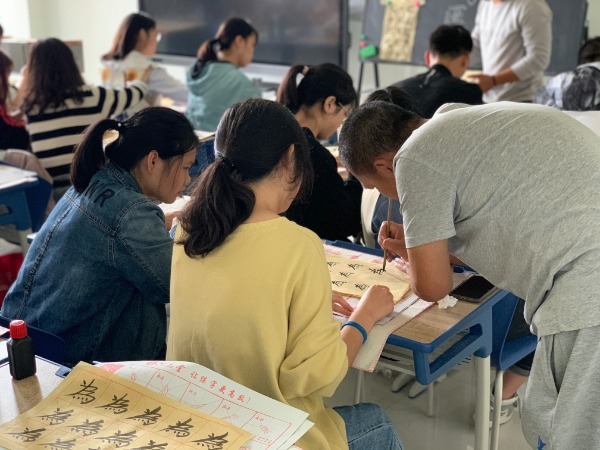An unlikely man of letters


A classical obsession
His interest in Chinese characters started when he learned calligraphy in primary school in Jinzhou.
There were so many traditional characters that he didn't know and had to find in the dictionary. His classmates and teachers nicknamed him the "dictionary walker".
He later started reading Chinese poems and lyrics.
Cai was good at literature but didn't excel in other subjects, such as science and math. He never thrived in school but flourished at the library.
He says he read over 300 books at a local library in one year during senior high.
"I looked for any book related to the Chinese language and literature in the library, which opened my mind and made me figure out what I really wanted to pursue," Cai says.
But Cai failed the college entrance exam and became a worker at a local rubber factory in the early 1990s.
During the three years at the plant, he spent all his free time in the library, reading "nearly every book inside".
He was laid off from the factory in 1994. With no money, no degree and no skills, he didn't have many choices.
He initially took a temporary job making steamed bread at a canteen for 100 yuan per month. It lasted for a year. Later, he purchased a tricycle and started his street-vendor life.
He lived on the seventh floor of a building without an elevator. So, he had to carry 20-kilogram boxes of water and food, such as popsicles in summer and sunflower seeds in winter, downstairs every morning and upstairs every evening.
He could make hundreds of yuan every month and was happy that he had a lot of time to read while waiting for buyers. When he earned money, he'd go to secondhand bookstores, where he could find cheap, and sometimes good, books.
He couldn't even afford the central-heating fee, which meant his home froze every winter. The indoor temperatures sometimes fell to nearly-20 C, he says.
"My wife always complained that it was no use studying such ancient literature, but I really love it," Cai says.
During his more than 10 years as a street vendor, Cai immersed himself in books, especially titles related to ancient Chinese writing and literature. He copied ancient books that libraries couldn't lend out, page by page. It took him over 20 days to copy the Confucian classic, Erya, he says.
He learned so much about the field that he attracted the attention of prominent scholar Qiu Xigui, a professor at Fudan University who even made changes to his own work based on Cai's suggestions.
Cai had also communicated about academic issues with several scholars by mail since the 1990s.
"Many experts can't compete with him in the realm of classical literature," says Qiu.




































